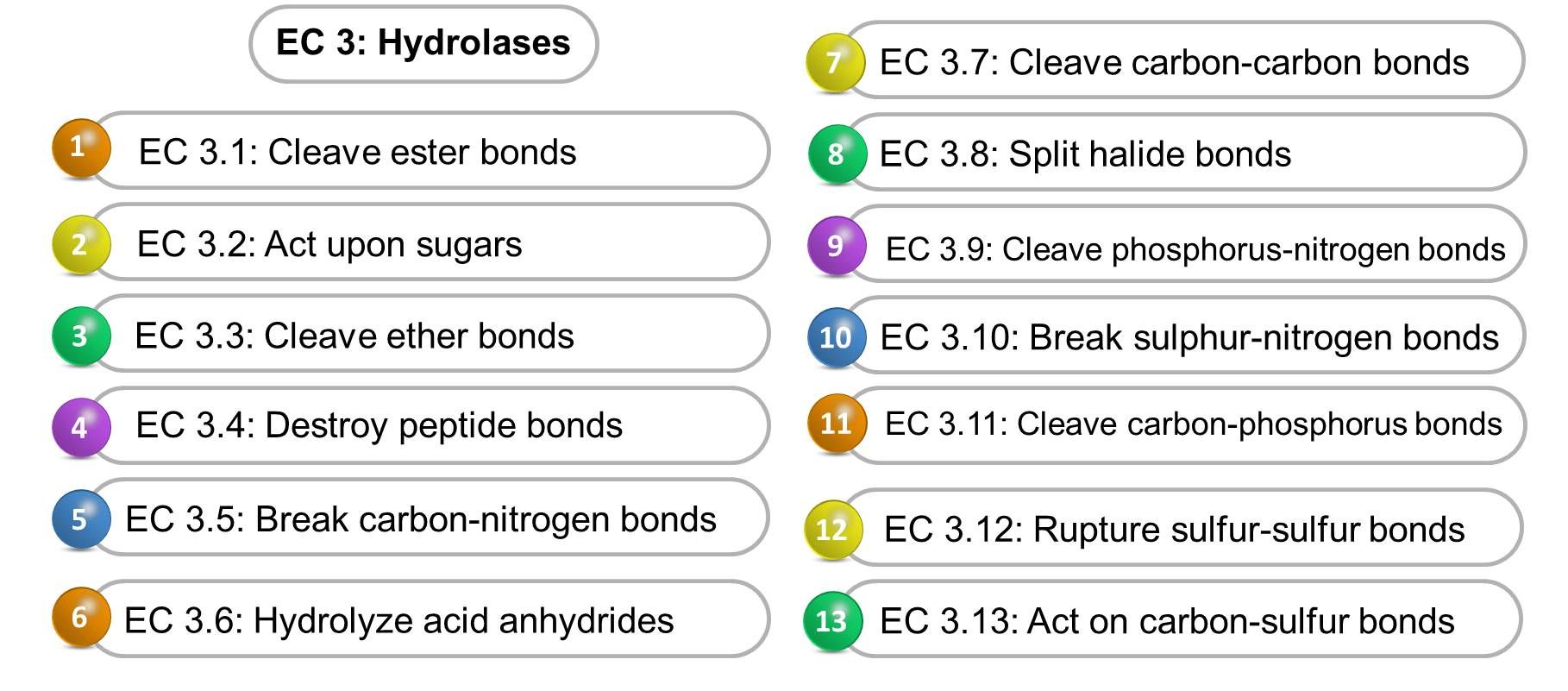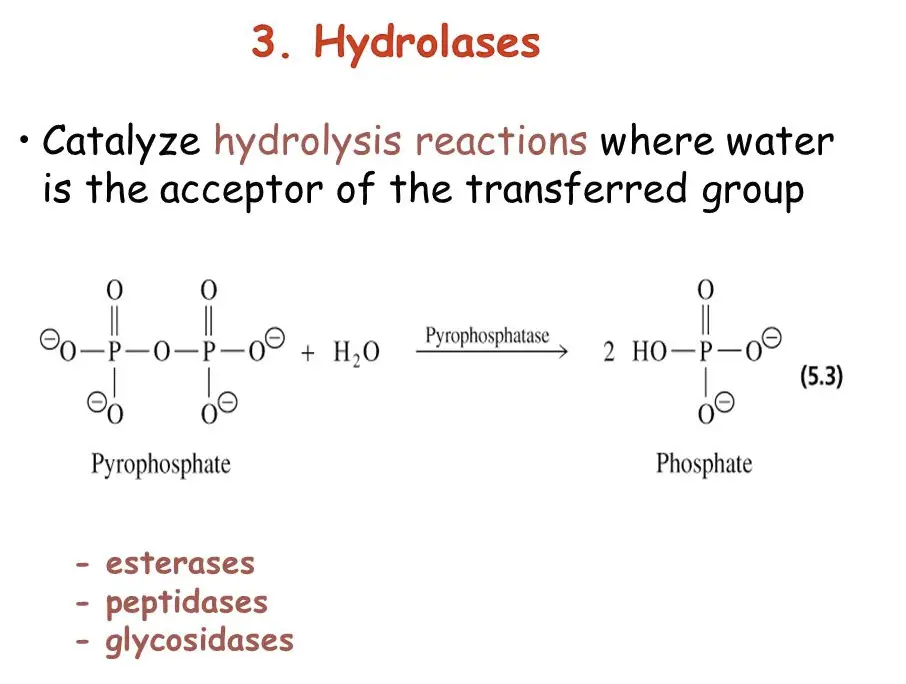What Are Hydrolases
What Are Hydrolases - Hydrolases are the group of enzymes that catalyze bond cleavages by reaction with water. The natural function of most hydrolases is. In simple words, a hydrolase is an enzyme that catalyzes the hydrolysis of a chemical bond in biomolecules. Hydrolases are hydrolytic enzymes that use water to catalyze the cleavage of chemical bonds, usually breaking a large molecule into two. In biochemistry, a hydrolase is an enzyme that speeds up the hydrolysis of proteins, starch, fats, nucleic acids, and other complex.
In simple words, a hydrolase is an enzyme that catalyzes the hydrolysis of a chemical bond in biomolecules. Hydrolases are the group of enzymes that catalyze bond cleavages by reaction with water. Hydrolases are hydrolytic enzymes that use water to catalyze the cleavage of chemical bonds, usually breaking a large molecule into two. The natural function of most hydrolases is. In biochemistry, a hydrolase is an enzyme that speeds up the hydrolysis of proteins, starch, fats, nucleic acids, and other complex.
In biochemistry, a hydrolase is an enzyme that speeds up the hydrolysis of proteins, starch, fats, nucleic acids, and other complex. In simple words, a hydrolase is an enzyme that catalyzes the hydrolysis of a chemical bond in biomolecules. The natural function of most hydrolases is. Hydrolases are hydrolytic enzymes that use water to catalyze the cleavage of chemical bonds, usually breaking a large molecule into two. Hydrolases are the group of enzymes that catalyze bond cleavages by reaction with water.
Hydrolase Introduction Creative Enzymes
Hydrolases are the group of enzymes that catalyze bond cleavages by reaction with water. In biochemistry, a hydrolase is an enzyme that speeds up the hydrolysis of proteins, starch, fats, nucleic acids, and other complex. Hydrolases are hydrolytic enzymes that use water to catalyze the cleavage of chemical bonds, usually breaking a large molecule into two. The natural function of.
Image Tutorial Glycoside Hydrolases
In simple words, a hydrolase is an enzyme that catalyzes the hydrolysis of a chemical bond in biomolecules. The natural function of most hydrolases is. In biochemistry, a hydrolase is an enzyme that speeds up the hydrolysis of proteins, starch, fats, nucleic acids, and other complex. Hydrolases are the group of enzymes that catalyze bond cleavages by reaction with water..
Hydrolase définition et explications
In biochemistry, a hydrolase is an enzyme that speeds up the hydrolysis of proteins, starch, fats, nucleic acids, and other complex. Hydrolases are hydrolytic enzymes that use water to catalyze the cleavage of chemical bonds, usually breaking a large molecule into two. Hydrolases are the group of enzymes that catalyze bond cleavages by reaction with water. The natural function of.
Hydrolase Meaning YouTube
In biochemistry, a hydrolase is an enzyme that speeds up the hydrolysis of proteins, starch, fats, nucleic acids, and other complex. In simple words, a hydrolase is an enzyme that catalyzes the hydrolysis of a chemical bond in biomolecules. Hydrolases are hydrolytic enzymes that use water to catalyze the cleavage of chemical bonds, usually breaking a large molecule into two..
Gels Free FullText Short Peptides for Hydrolase Supramolecular
The natural function of most hydrolases is. In simple words, a hydrolase is an enzyme that catalyzes the hydrolysis of a chemical bond in biomolecules. In biochemistry, a hydrolase is an enzyme that speeds up the hydrolysis of proteins, starch, fats, nucleic acids, and other complex. Hydrolases are the group of enzymes that catalyze bond cleavages by reaction with water..
Hydrolases Enzyme Biochemistry
Hydrolases are the group of enzymes that catalyze bond cleavages by reaction with water. Hydrolases are hydrolytic enzymes that use water to catalyze the cleavage of chemical bonds, usually breaking a large molecule into two. The natural function of most hydrolases is. In biochemistry, a hydrolase is an enzyme that speeds up the hydrolysis of proteins, starch, fats, nucleic acids,.
Expanding the Toolkit for the Serine Hydrolases Chemistry & Biology
Hydrolases are the group of enzymes that catalyze bond cleavages by reaction with water. Hydrolases are hydrolytic enzymes that use water to catalyze the cleavage of chemical bonds, usually breaking a large molecule into two. In biochemistry, a hydrolase is an enzyme that speeds up the hydrolysis of proteins, starch, fats, nucleic acids, and other complex. In simple words, a.
CN Hydrolases
In simple words, a hydrolase is an enzyme that catalyzes the hydrolysis of a chemical bond in biomolecules. In biochemistry, a hydrolase is an enzyme that speeds up the hydrolysis of proteins, starch, fats, nucleic acids, and other complex. Hydrolases are hydrolytic enzymes that use water to catalyze the cleavage of chemical bonds, usually breaking a large molecule into two..
What are Hydrolase Enzymes? MCAT Biochemistry YouTube
The natural function of most hydrolases is. In simple words, a hydrolase is an enzyme that catalyzes the hydrolysis of a chemical bond in biomolecules. Hydrolases are the group of enzymes that catalyze bond cleavages by reaction with water. Hydrolases are hydrolytic enzymes that use water to catalyze the cleavage of chemical bonds, usually breaking a large molecule into two..
Difference Between Hydrolase And Transferase Relationship Between
Hydrolases are the group of enzymes that catalyze bond cleavages by reaction with water. In biochemistry, a hydrolase is an enzyme that speeds up the hydrolysis of proteins, starch, fats, nucleic acids, and other complex. The natural function of most hydrolases is. In simple words, a hydrolase is an enzyme that catalyzes the hydrolysis of a chemical bond in biomolecules..
Hydrolases Are The Group Of Enzymes That Catalyze Bond Cleavages By Reaction With Water.
In biochemistry, a hydrolase is an enzyme that speeds up the hydrolysis of proteins, starch, fats, nucleic acids, and other complex. The natural function of most hydrolases is. In simple words, a hydrolase is an enzyme that catalyzes the hydrolysis of a chemical bond in biomolecules. Hydrolases are hydrolytic enzymes that use water to catalyze the cleavage of chemical bonds, usually breaking a large molecule into two.









